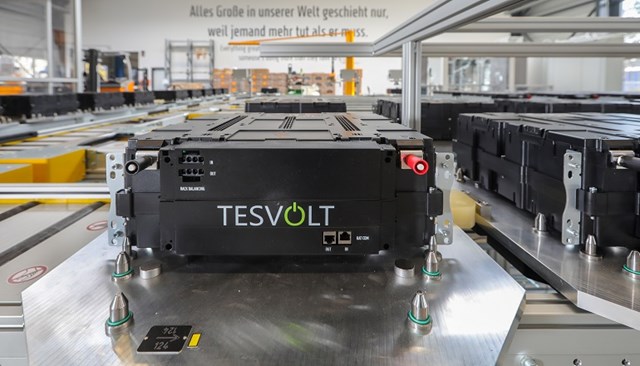Tesvolt has begun production at Europe’s first battery storage system gigafactory.
The Wittenberg facility, in Germany, is manufacturing lithium-ion battery storage systems to meet growing demand for stationary energy.
Tesvolt’s factory manufactures battery storage systems in various size categories with storage capacities ranging from 9.6 kilowatt hour into the megawatt hour (MWh) category.
The facility will be able to produce storage systems with a total capacity of up to 1MWh daily and 255MWh annually.
Tesvolt will gradually add capacity to “account for the current increase in demand”, and says its order volume has almost tripled since the same quarter last year.
Production in the new factory is subject to stringent safety precautions. Additional measures are being taken to protect staff and customers from COVID-19, said the company.
Tesvolt managing director Daniel Hannemann said: “The coronavirus crisis is a major concern for us as a manufacturer as well as on a human level. We’re very grateful that we were able to close the first quarter with strong turnover figures.”
Demand has “spiked in particular” for storage systems with an emergency power function as well as for off-grid storage, according to Hannemann.
“We don’t know how demand will change in light of the coronavirus crisis. We want to work closely with our customers to overcome these new challenges in a spirit of solidarity, creativity, flexibility and ingenuity,” he said.
Tesvolt engineering director and co-founder Simon Schandert said: “When it comes to COVID-19, our employees’ safety is of course our top priority. Three weeks ago we asked all staff who can do so to work from home — including production planning staff.
“In production itself, meanwhile, employees are still at work but isolated from one another.
“We’re lucky that production is continuing at our battery cell supplier Samsung SDI in Korea.”
The Tesvolt factory’s production process includes semi-automated full-cycling, where every battery module is fully charged and discharged and checked for anomalies in terms of temperature, voltage and internal resistance.
After this step, fully automated end-of-line inspection ensures the “highest possible” quality, where modules that do not meet high performance standards are automatically removed from the process.
The company has also switched its European roadshow over to a webinar format.


